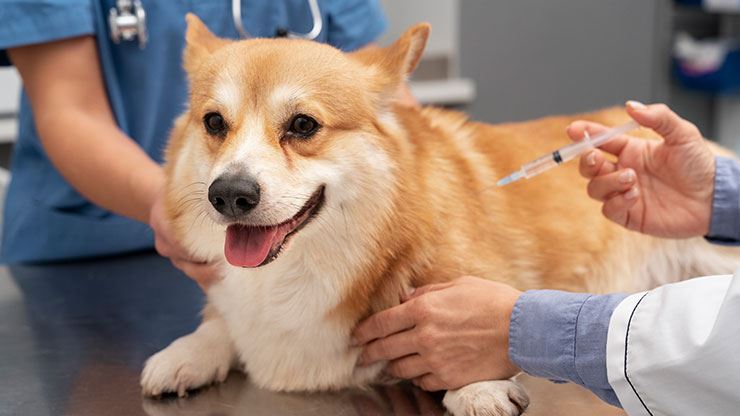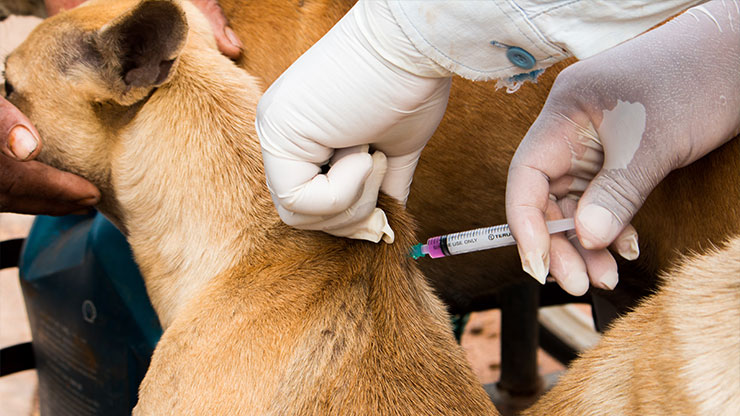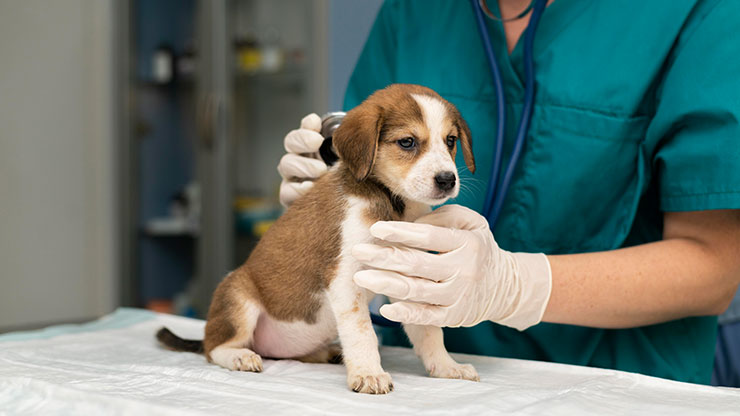
The Importance of Vaccinations: Protecting Your Dog and the Community
Protecting our dogs is a huge responsibility when we bring our furry friends home. Part of that means keeping them happy and healthy. The best way to do that is to understand the importance of vaccinations. Not only does it protect your dog, but it also protects the community as well.
A vaccination is a biological preparation used to protect humans and animals against harmful diseases and contagions. They are typically administered as an injection, or series of injections, before the animal or human being is exposed to the contagion. According to the World Health Organization, vaccines use the body’s natural defenses to build resistance to specific infections and strengthen the immune system. Vaccines train the immune system to create antibodies, just as it does when exposed to a disease, but without causing the body disease.
Let’s talk about everything you should know about dog vaccinations so when it’s time to talk about them with your vet, you both are on the same page.
What is a Dog Vaccine?
Dog vaccines are intended for animals and would not be used on humans. That said, they have a lot of similarities. Dog vaccines are medical products that contain antigens. They have been modified or inactivated so the vaccine can’t cause disease. But the antigens are parts of the pathogen that will initiate an immune response. The immune response will trigger antibodies that protect your furry friend against future infections with the same pathogen.
What Do Dog Vaccines Treat?
Dog vaccines are preventative medicine to help treat various illnesses and diseases that can occur in dogs. The types of illnesses and diseases can be:
- Viruses
- Bacteria
- Parasites
Common dog vaccines are meant to treat some of the following diseases.
- Rabies: a viral disease that can be transmitted to humans and is almost always fatal once symptoms appear. Vaccination is required by law in many areas.
- Distemper: a viral disease that affects dogs and can cause neurological symptoms, respiratory problems, and digestive issues.
- Parvovirus: a viral disease that affects dogs and can cause severe vomiting, diarrhea, and dehydration.
- Kennel cough: is a highly contagious respiratory disease.
Getting the right vaccine to treat these specific problems is crucial. For instance, the Bordetella vaccine for kennel cough is specific to that illness. A veterinarian will explain this to you.

Important Reasons to Vaccinate Your Dog
It may already seem essential to why you should vaccinate your dog. Let’s elaborate on some of the most important points.
Disease Protection
As mentioned, your dog can pick up several deadly illnesses and diseases without vaccination. In contrast, your dog may still pick up illnesses, but their chances of life-threatening disease decrease. This is especially important for baby animals, as they are more susceptible to infection and disease.
Prevention of Disease Spreading
Scientists estimate that nearly six out of ten known infectious diseases can be spread from animals to humans. One of these diseases is rabies which is deadly for animals and humans. Diseases that can spread from animal to human are called zoonotic diseases.
Long-Term Financial Benefit
If, in the unfortunate event, your puppy does pick up an infectious disease that could have otherwise been prevented through vaccination, treating them for that disease can be expensive. Getting your dog vaccinated can save their life and save a lot of money in expensive veterinarian bills.
Treating a Dog with Rabies
Sadly, let’s consider the example of treating a dog with rabies. Unfortunately, there is no cure for the disease once symptoms develop. Hence, ensuring vaccination is key. The cost of treating a dog with rabies will vary depending on where you live, the cost of veterinarian care, and the severity of the case. Medical expenses typically involve hospitalization and supportive care to manage severe symptoms such as fever, seizures, and difficulty breathing.
Hospitalization and taking care of your pup isn’t the only concern. There are likely also costs associated with quarantining the dog since rabies is highly contagious. The law of where you live will determine what level of quarantining needs to be done.
Legal Responsibility
The rabies vaccines, among others, are required by law in many states. Failure to vaccinate your dog can result in fines and other legal consequences.
Risks of Vaccinating Your Dog
All medical procedures, both human and dog, carry some sort of risk. But the benefits outweigh the risk. This is especially true for immunizing puppies. Let’s take a look at some of the potential risks or side effects.
- slight fever
- swelling or soreness at the injection site
- decreased appetite (usually resolves within a day or two)
In rare cases, an allergic reaction to a vaccine is possible. In these cases, difficulty breathing, facial swelling, and hives may occur. It is important to note that not only is this uncommon but also typically able to be treated immediately.

What You Need to Know About Vaccines and Puppies
Vaccinations are an even more critical part of the development and health of puppies and kittens. They are given on a schedule determined by your vet. This is because puppies receive maternal antibodies from their mother when they are born. These antibodies protect the puppy from the same diseases that the mother is protected against.
But the catch is that they only last a few weeks. When they start to fade, puppies are given a series of shots beginning at 6-8 weeks and continuing every 3-4 weeks until the puppy is 16 weeks old. This will provide the extra support puppies need while their immune systems develop.
Follow-up care for puppies is more important than for older dogs who have already been treated for vaccines. This is because it is their first time. All follow-up care, however, is recommended.
What to Expect After Getting Your Furry Friend Vaccinated
The following can be expected after you get your dog vaccinated:
- Mild side effects: Similar to humans, some dogs may experience mild side effects once vaccinated. You may notice they are tired, have a small fever, or have mild swelling or soreness near the injection side. After a day or two, they should subside.
- Increased immunity: After they go through the side effects, your dog’s immunity will return stronger. It will produce antibodies to protect them against the disease they are vaccinated for. However, this process does take time, so full protection is not immediate.
- Continued protection: Many vaccines provide long-lasting or lifelong protection against the disease they are vaccinated for. But sometimes, a booster shot or secondary vaccination may be necessary.
- Follow-up care: Sometimes, a veterinarian may ask the owner for a follow-up visit to see how the dog is doing. Sometimes a phone call or a virtual visit is put in place of this.
While we have mentioned that serious reactions are uncommon, if you notice any concerning symptoms or changes in your dog’s behavior, you should contact a veterinarian immediately.
When To Seek Immediate Attention:
- Vomiting or diarrhea that does not subside
- Itchy skin that has bumps or rash (these are hives)
- Noticeable swelling around the muzzle or the face, neck, or eyes
- Persistent coughing or difficulty breathing
- Any collapse
Consulting With Your Vet
While this may seem like a lot of information, the good news is that your vet will have the perfect plan for your dog. They will know best what vaccinations are required by law and are recommended to keep your furry friend healthy. They will also be able to address any concerns and talk about the risks. Most importantly, they will know about allergies or irritations your dog may already have. If you have a puppy, they will also understand what vaccinations are needed.










